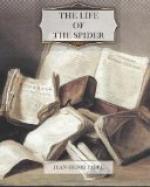Then, suddenly, teased by the air-currents, the delicate mooring breaks and flies through space. Behold the emigrants off and away, clinging to their thread. If the wind be favourable, they can land at great distances. Their departure is thus continued for a week or two, in bands more or less numerous, according to the temperature and the brightness of the day. If the sky be overcast, none dreams of leaving. The travellers need the kisses of the sun, which give energy and vigour.
At last, the whole family has disappeared, carried afar by its flying-ropes. The mother remains alone. The loss of her offspring hardly seems to distress her. She retains her usual colour and plumpness, which is a sign that the maternal exertions have not been too much for her.
I also notice an increased fervour in the chase. While burdened with her family, she was remarkably abstemious, accepting only with great reserve the game placed at her disposal. The coldness of the season may have militated against copious refections; perhaps also the weight of the little ones hampered her movements and made her more discreet in attacking the prey.
To-day, cheered by the fine weather and able to move freely, she hurries up from her lair each time I set a tit-bit to her liking buzzing at the entrance to her burrow; she comes and takes from my fingers the savoury Locust, the portly Anoxia; {26} and this performance is repeated daily, whenever I have the leisure to devote to it. After a frugal winter, the time has come for plentiful repasts.
This appetite tells us that the animal is not at the point of death; one does not feast in this way with a played-out stomach. My boarders are entering in full vigour upon their fourth year. In the winter, in the fields, I used to find large mothers, carting their young, and others not much more than half their size. The whole series, therefore, represented three generations. And now, in my earthenware pans, after the departure of the family, the old matrons still carry on and continue as strong as ever. Every outward appearance tells us that, after becoming great-grandmothers, they still keep themselves fit for propagating their species.
The facts correspond with these anticipations. When September returns, my captives are dragging a bag as bulky as that of last year. For a long time, even when the eggs of the others have been hatched for some weeks past, the mothers come daily to the threshold of the burrow and hold out their wallets for incubation by the sun. Their perseverance is not rewarded: nothing issues from the satin purse; nothing stirs within. Why? Because, in the prison of my cages, the eggs have had no father. Tired of waiting and at last recognizing the barrenness of their produce, they push the bag of eggs outside the burrow and trouble about it no more. At the return of spring, by which time the family, if developed according to rule, would have been emancipated, they die. The mighty Spider of the waste-lands, therefore, attains to an even more patriarchal age than her neighbour the Sacred Beetle: {27} she lives for five years at the very least.




